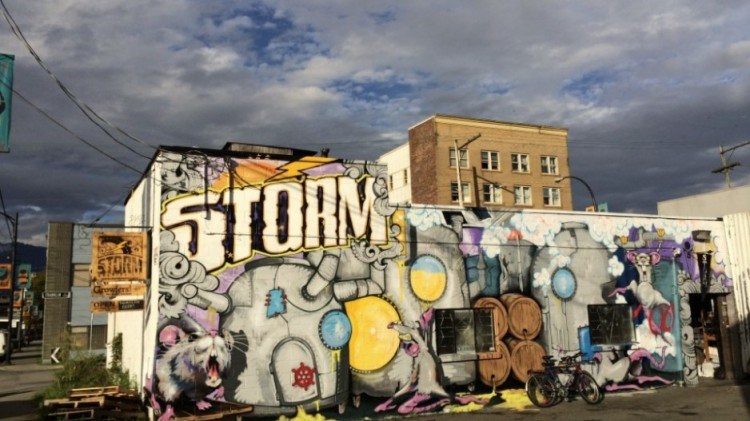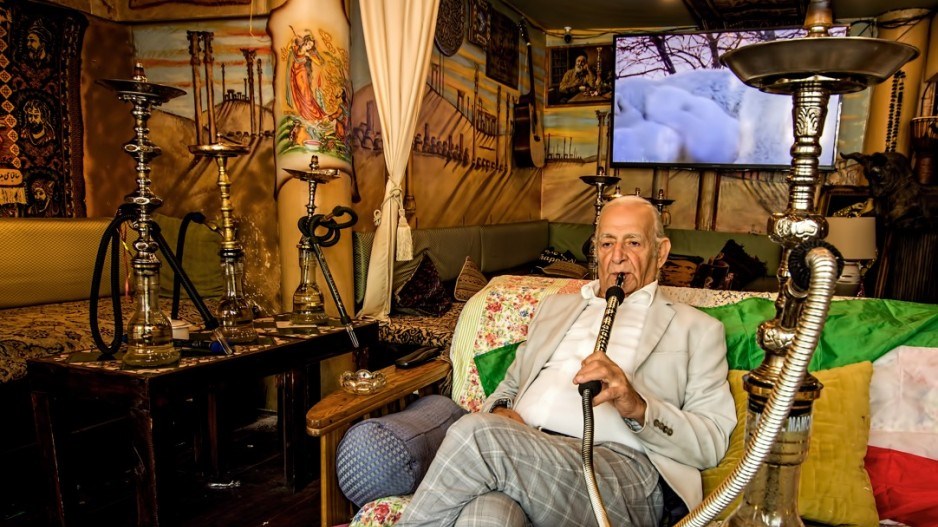The City of Vancouver is once again trying to close the city’s two hookah lounges, alleging that “smoking” is taking place and that this breaks a city bylaw.
The owner of one of the lounges, Persian Tea House owner Mohammadian (Hamid) Abdolhamid, told BIV that he is willing to go on a hunger strike if he is forced to close, much like he did for 19 days in 2015, when the city backed off and allowed him to continue to operate the business he has run since 1998.
Vancouver’s only other hookah lounge is the Ahwaz Hookah House at 1322 West Georgia Street.
Customers at Hamid’s lounge at 668 Davie Street suck flavoured water vapour out of pipes, which are attached to stand-alone devices that have water in the base.
He puts flavoured molasses in a small cup, wraps it with punctured tinfoil, tops it with a hot charcoal, and puts the cup on top of the stand-alone devices. He charges $35 and provides free tea.
Traditionally, instead of the flavoured molasses, the cup at the top of the devices contains tobacco. Hamid insists, however, that the product he uses does not contain tobacco. He showed BIV a tub of shisha molasses made by Ottawa-based Bubbly. The container states that there is no tobacco, no nicotine and no tar.
Hamid maintains that hookah is a centuries-old Middle Eastern tradition that is widespread in his home country of Iran. His lounge contains antiques and items from the Middle East.
Hamid shows some shisha wrapped in perforated tinfoil and topped with a charcoal brick that he had just blowtorched. | Glen Korstrom, BIV
Customers such as Glowbal Group owner Emad Yacoub agree.
“This place is becoming like a hub for new immigrants who come to Canada and don't speak a word of English,” said Yacoub, who immigrated to Canada from Egypt in 1984, when he spoke little English.
“It’s a little slice of home.”
Vancouver’s chief building official, Saul Schwebs, on July 25 sent the Persian Tea House’s landlord, Yip Lai, an order to cease “the unauthorized use of hookah lounge within 14 days of this order.”
Failing to comply would result in the matter referred to the city prosecutor with a request to approve charges under the city’s bylaw, the order said.
The order also threatened the landlord with possible fines of up to $500 per day if the order was not followed.
Hamid then received a note from his landlord, dated Aug. 8, which ordered him to “cease smoking inside the premises,” and obey the city order.
“I am 77 years old,” Hamid told BIV. “What can I do? This business is my life.”
Hamid’s lawyer, Dean Davison, told BIV that he represented two hookah stores in Burnaby in 2021, when the City of Burnaby was attempting to close hookah lounges in that suburb because there was “smoking” inside.
Discussions with Burnaby’s mayor and city council resulted in the city directing staff to draft a bylaw to grandfather in the existing hookah-lounge businesses so they could continue to operate.
That bylaw went into effect Jan. 1, 2022.
“They can't sell their businesses but as long as they're running their businesses, they can stay open,” Davison said of the Burnaby hookah shop owners.
“We would love the City of Vancouver to do the same thing.”
BIV spoke with Abbas Abdiannia, who owns Vancouver’s other hookah lounge, Ahwaz Hookah House, and he confirmed that the city is also coming after his business.
“We want the same thing that Burnaby gave to its hookah bars,” he said.
Vancouver’s longest-serving city councillor, Adriane Carr, who has been on council since 2011, told BIV that she believes grandfathering Vancouver hookah shops is a viable solution.
“It does sound reasonable, especially if there is no public harm,” she said.
Carr said that she in the past put forward a resolution that was unanimously supported at city council to “get the provincial government to allow smoking in safe injection sites in order for people to not have to leave those sites and be more vulnerable on the street.”
One customer who was at the Persian Tea House when BIV visited said that he uses the hookah waterpipe because he believes it is safer than vaping.
Hamid's shisha is made by Ottawa-based Bubbly, and it comes in tubs that says that it does not contain tobacco, nicotine or tar. | Glen Korstrom, BIV
No one from the City of Vancouver would agree to an interview and its media relations team only sent short email responses to BIV questions.
When BIV asked why city staff in Vancouver are not following Burnaby’s example, and allowing existing hookah shops to operate, the city’s response was that "there is no business licence for this location. As this is an active investigation, we are unable to provide more information at this time.”
Hamid said he paid for a city business licence until 2007, but the city took away that licence. He would be willing to pay the city for a business licence if the city were to allow him to have one, he said.
Illegal and unlicensed cannabis stores proliferated in Vancouver in the past decade, with the city eventually licensing those illegal businesses long before Canada legalized non-medical cannabis sales in 2018.
Hamid’s past legal troubles and 2015 hunger strike
Hamid in 2008 was charged with violating a 2007 city health bylaw that banned indoor smoking in commercial establishments.
That bylaw originally had an exemption for hookah and cigar lounges, but city council removed that exemption in 2008.
A seven-year court battle ensued.
In 2015, BC Supreme Court Justice Peter Leask dismissed the two hookah lounge owners’ appeal and gave the lounges 30 days to remain open.
Leask rejected the lounge owners' arguments that the molasses mixture, or shisha, in their hookah waterpipes wasn't burning, that the city’s bylaw definition of smoking was too broad, that the city was overstepping its power to protect public health, and that the city’s bylaw violated Charter Rights.
Hamid went on a widely reported hunger strike in 2015, which he said ended after 19 days. The city and health officials backed off attempts to fine or shut him down and the matter has been in a state of stasis ever since.
He maintains a laminated 2011 permit from Vancouver Coastal Health saying that he may operate.
BIV asked Provincial Health Officer Dr. Bonnie Henry and Vancouver Coastal Health chief medical health officer Dr. Patricia Daly whether they think ingesting hookah water-vapour fumes is harmful and whether they have any concerns about health risks from sharing vape pipes. BIV did not get a response by press time.
Hamid provides individual plastic pipe heads to customers so they need not put their lips to the same pipe end that is used by others who might share their hookah.
City of Vancouver coming after businesses for long-ignored bylaw infractions
This is not the first time in recent months that city officials have suddenly pounced on a business that they deem to be in violation of city bylaws.
A bylaw officer in early June told East Vancouver’s Storm Brewing owner James Walton that he had to remove his nearly 10-year-old mural because it promoted drinking as it shows kegs of beer with beer flowing out, and some rats seemingly consuming the beer and getting drunk.
That contravened city bylaws, the officer said.
The mural also contained the brewery’s branding but Walton told BIV that this was not the bylaw officer’s complaint.

Storm Brewing's mural has been up for almost 10 years | @StormBrewingVan on X (formerly Twitter)
A massive outcry ensued after Storm Brewing posted on social media about having to remove its mural. City councillors were quick to voice support.
Vancouver city council then on July 25 passed a motion to allow Storm Brewing to keep its artwork, and ask city staff to update bylaws to allow similar murals on business properties.


